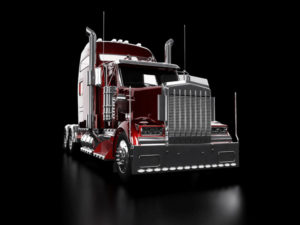 Semi-trucks are an integral part of the American economy, hauling everything from lumber to gasoline from place to place every day. While large trucks are involved in a lower rate of crashes[1] resulting in nonfatal injuries or property damage only per mile traveled than passenger vehicles, they nevertheless are involved in a significant number of accidents each year. In fact, the National Highway Traffic Safety Administration (NHTSA) indicates[2] that approximately 104,000 people were injured in accidents involving large trucks in 2012 alone. Modern semi-trucks can weigh as much as 80,000 pounds and often travel at speeds of 70 miles per hour or more. As a result, when they are involved in accidents, they have the potential to cause extremely serious injuries and significant damage to property.
Semi-trucks are an integral part of the American economy, hauling everything from lumber to gasoline from place to place every day. While large trucks are involved in a lower rate of crashes[1] resulting in nonfatal injuries or property damage only per mile traveled than passenger vehicles, they nevertheless are involved in a significant number of accidents each year. In fact, the National Highway Traffic Safety Administration (NHTSA) indicates[2] that approximately 104,000 people were injured in accidents involving large trucks in 2012 alone. Modern semi-trucks can weigh as much as 80,000 pounds and often travel at speeds of 70 miles per hour or more. As a result, when they are involved in accidents, they have the potential to cause extremely serious injuries and significant damage to property.
Truck accidents can occur in a variety of ways and can be caused by a number of different parties. The modern trucking industry is extremely complicated, involving several different players, including truck drivers, trucking companies, truck manufacturers, truck equipment suppliers, and the parties that hire truckers and trucking companies to move their product from one place to another. Anyone of these parties could potentially be held liable for a truck accident, depending on the reason a truck accident happened.
The information below is intended to provide readers with an introduction to the most common causes of a trucking accident. Additional information can be found by clicking the links found at the bottom of the article.
Truck Accidents Can Be Caused By Driver Error
The vast majority of motor vehicle accidents occur because of driver error.[3] There are many ways that a truck driver could cause an accident. Some of the most common are detailed below.
- Driver Fatigue – Truck drivers are often required to adhere to grueling schedules, often driving as many as 11 hours a day or more. In order to combat driver fatigue, the Federal Motor Carrier Safety Administration (FMCSA) has created rules that limit the number of hours that a driver can operate his or her vehicle in a given period and imposes strict penalties for drivers who violate these rules. Unfortunately, drivers are often incentivized to break these rules by trucking companies or customers, resulting in a situation where there are a significant number of fatigued drivers on the road. Fatigue can have many deleterious effects on a driver, including reduced awareness, impaired reaction time, poor judgment, and issues with concentration. As a result, fatigued truck drivers cause a significant number of accidents each year
- Drug or Alcohol Use – Alcohol or drug use and driving are a dangerous combination. When a truck driver drives while impaired, he or she is much more likely to be involved in a serious accident. While strict federal regulations prohibit truck drivers from operating their vehicles while impaired, this issue continues to be a problem, sometimes with serious consequences.
- Failure to Conduct a Pre-Trip Inspection – Federal law requires that truck drivers conduct a pre-trip inspection of their vehicles to make sure that they are in a condition in which they are safe to drive. If a truck driver fails to conduct such an inspection, his or her vehicle may have serious issues that make an accident much more likely. Common issues that could be missed include under-inflated tires, faulty coupling devices, broken or malfunctioning lights, or fluid leaks.
- Driver Error Resulting in Truck Rollovers – Truck rollovers[5] are among the most dangerous kinds of accidents in which a semi-truck can be involved. There are many ways that a truck driver could cause a preventable rollover accident, including speeding, taking turns too fast, improper braking, or oversteering.
Truck Accidents Can Be Caused By Defective Vehicles
Modern semi-trucks are extremely complicated vehicles that have literally thousands of parts that have the potential to fail. Some of the more common include the following:
- Brakes
- Coupling devices
- Windshield wipers
- Headlights
- Tail lights
- Steering mechanisms
- Electronic stability control systems
- Tires
- Axles
- Instrument failure
Accidents that are caused by vehicle defects or vehicle equipment defects often give rise to complicated lawsuits that involve product liability law. Under general product liability principles, individuals who are injured by defective products may be able to recover for their losses by suing the designer, manufacturer, or retailer of the product. In addition, if the truck driver or trucking company knew or should have known that a particular vehicle or piece of equipment was faulty, victims may be able to recover from either of those parties as well.
Truck Accidents Can Be Caused By Poor Weather

As anyone who has driven in poor weather understands, rain, snow, ice, wind, and fog can have an extremely detrimental effect on a vehicle’s performance. Poor weather is no excuse for negligent driving, however, and federal regulations[6] require that truck drivers use “extreme caution” when hazardous conditions such as “snow, ice, sleet, fog, mist, rain, dust, or smoke, adversely affect visibility or traction.” In fact, these regulations require that a truck driver discontinue operating his or her vehicle if conditions become sufficiently dangerous. Many types of truck accidents can be the result of poor weather. Some of the most common include the following:
- Read-End Accidents – Snow, ice, rain, and sleet all can adversely affect stopping distance. If a truck driver is driving too fast considering the conditions or following too closely, a rear-end accident[7] may result.
- Rollover Accidents – Trucks have a much larger vertical surface area than most passenger vehicles, so high winds can significantly affect their stability. In some cases, a sufficiently strong gust of wind can cause a truck to roll onto its side.
- Broadside Accidents – Also referred to as “T-bone accidents,” broadside accidents can occur when a driver’s visibility is impaired by poor weather or if he or she is unable to stop at an intersection due to poor road conditions.
- Sideswipe Accidents – Because poor weather can have a significant impact on a truck driver’s visibility, it can make it more likely that he or she will attempt to change lanes while another vehicle is next to his or her truck.
Truck Accident Victims Should Seek Medical Attention
Anyone who has been involved in a truck accident should seek medical attention as soon as possible. This is true even if victims do not believe that they are injured, as many injuries take hours or even days to develop symptoms. Seeking medical attention will ensure that your injuries are properly diagnosed and treated. In addition, the medical professional that you see will generate an official record that may be useful in establishing liability should your claim become contested.
- http://www.iihs.org/iihs/topics/t/large-trucks/qanda
- http://www-nrd.nhtsa.dot.gov/Pubs/811868.pdf
- http://www.alertdriving.com/home/fleet-alert-magazine/international/human-error-accounts-90-road-accidents
- http://www.reuters.com/article/2013/10/25/us-drug-truckdrivers-idUSBRE99O0T520131025
- http://www.ncbi.nlm.nih.gov/pmc/articles/PMC3256782/
- http://www.fmcsa.dot.gov/content/39214
- http://en.wikipedia.org/wiki/Rear-end_collision